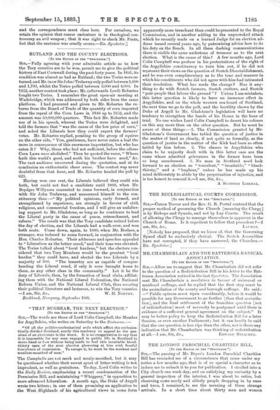"THAT BUGBEAR, THE NEXT ELECTION."
[To THZ EDITOR OF THE "Bracr.Toa.1 Slit,—The words are those of Lord Colin Campbell, the Member for Argyllshire, who writes on Saturday to the Scotsman :— " Of all the politico-ecclesiastical evils which afflict the ecclesias- tically-divided Scotland, surely this tendency to appeal to the pas- eons of an electorate is the worst. It is no exaggeration to say that it is impossible for any man engaged in public life in Scotland to move hand or foot without being made to feel this insatiable blood- thirsty ogre of the next election glowering at him with fearful truculence of expression. To escape it, he must be the meekest and enealiest-mouthed of men."
The Campbells are rot meek and mealy-mouthed, but it may 'be questioned whether their recent spurt of letter-writing is hot imprudent, as well as gratuitous. To-day, Lord Colin writes to
the Daily Review, emphasising a recent condemnation of the Permissive Bill, and maintaining " Whiggery," in opposition to
more advanced Liberalism. A month ago, the Duke of Argyll wrote two letters ; in one of them promising an application to the West Highlands of his agricultural views in some form
apparently more trenchant than could be presented to the Royal Commission, and in another adding to the unprovoked attack which he recently made on a learned Judge for an election ad- dress issued several years ago, by patronising advice how to do his duty on the Bench. In all these dashing communications there is visible the same undertone of tremour as to the next election. What is the cause of this ? A few months ago, Lord Colin Campbell was profuse in his protestations of the right of the Argyllshire constituency to turn him out, if he did not represent their views on the question of Scotch Disestablishment, and be was even complimentary as to the tone and manner in which his constituents who did not agree with him had intimated their resolution. What has made the change ? Has it any- thing to do with Scotch farmers, Scotch crofters, and Scotch " puir people that labour the ground " ? Unless I am mistaken, this latter question is likely to have an immense effect in Argyllshire, and on the whole western sea-board of Scotland, the next time we go to the poll, and the hostility shown by the Duke of Argyll to Mr. Gladstone's legislation will have no tendency to strengthen the bands of his House in the hour of trial. No one wishes Lord Colin Campbell to desert his colours on this any more than on the other question. But he must be aware of three things :-1. The Commission granted by Mr- Gladstone's Government has tabled the question of justice in the matter of land as clearly, if not quite as formally, as the question of justice in the matter of the Kirk had been so often tabled by him before. 2. The classes in Argyllshire who claim to be unjustly dealt with in this latter case are the same whose admitted grievances in the former have been so long unredressed. 3. No man in Scotland need look forward to an election as " truculent," " insatiable," " blood- thirsty," and a "bugbear," unless he has made up his mind deliberately to abide by the perpetuation of injustice, and is too honest to conceal it.—I am, Sir, &c.,
A SCOTTISH LIBERAL.


































 Previous page
Previous page